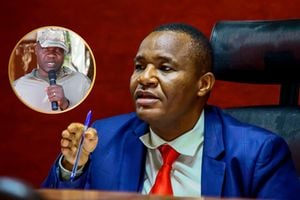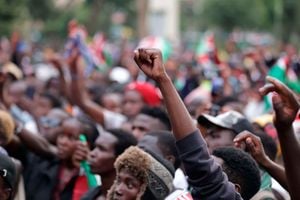
Citizens fill forms during the public participation on the proposed impeachment of Deputy President Rigathi Gachagua at Bomas of Kenya, Nairobi on October 4, 2024.
It would be unpardonably disingenuous at this point to feign ignorance of the fact that significant portion of the national bandwidth ordinarily devoted to political discourse is presently preoccupied with a notice of motion before the National Assembly seeking the removal of the deputy president from office by way of impeachment, setting the stage for a parliamentary process of unprecedented architectonic political and constitutional consequence.
This is not going to be a discussion of the merits or even the facts of the motion, or a dissection of the person or office of the deputy president in any shape or form. Rather, it will be an invitation to reflect on the magnitude of this moment, and the tantalising possibility that our country's politics has, for better or worse, forever escaped the disconcerting liminality which, like a relentless quagmire, has for a decade and half, arrested us from exiting the ancient dispensation and entering the progressive, liberal democratic order.
In many ways, the new dispensation inaugurated did not take off because many of its defining mandates – the crowning achievements of the reform struggle - were illegitimately neglected, defied or deferred, wholly or partially, in letter and in spirit. A perverse transition ensued, characterised by the survival of institutions that were explicitly consigned to extinction, and a robust reluctance to embrace liberating transformations.
Thus, devolution is at best ramshackle, something between a perpetual hatchling and exorbitant make-believe, with ethno-regional colossi presiding over inadequately funded functions and sketchy offices, both overwhelmed by minimal allocations from national revenues, and miserably unable to mobilise resources by themselves. In the meantime, the constituency development fund, an obsolescent anomaly and quintessence of titanic parliamentary muscle, not only survives, but blossoms.
Governance model
Similarly, emphatic edicts on leadership and integrity, inscribed in a dedicated chapter of the constitution, are universally proclaimed but marginally championed. Consequently, leaders who ought to be paragons and our foremost models, frequently find themselves implicated in corruption, economic crimes and money laundering, while offensive malpractices like nepotism are commonplace. Anti-corruption and every attempt to introduce a measure of hygiene into the system are the costly, frustrating, time-consuming and often futile exertions of eternal optimists and indefatigable idealists.
The overarching nation-building project, aimed at perfecting a republic forged out of diversity in the struggle against colonial savagery, by citizens who agreed to forego the dubious comfort of tribal affiliations in pursuit of the glory of sovereignty on a vaster scale, is being sabotaged by naked tribalism under hollow pretences.
It is worth remembering that in August, 2010, we turned our backs on an epoch where contemplating the removal of the president from office was treasonous insofar as the person and office of president were not just one entity; the presidency was a personal monopoly expected to endure a lifetime. All national institutions, offices and resources were, in practice, mere extensions of the president's personal estate, and administered at his discretion. The presidency furnished us with a governance model to be replicated in diminishing order, by regional titans and grassroots-level despots.
National unity
Formally, the constitution disrupted this system and introduced pluralistic, competitive, elective leadership at all levels. Once elected, leaders were to be further constrained by term limits and rigorous standards of accountability. In practice, the proclivities of our traumatic yesteryear persisted and consequently, our democracy has become a mechanism for administering ethno-regional “turns to eat”.
Elections are do-or-die contests waged by all means, fair and foul, because incumbency is deemed to confer illimitable public resources for use at their discretion. That is why our politicians waste no opportunity to remind anyone for the umpteenth time, that they won the last election, and prefer to say that they are, or are not “in power”, not “in office”. This type of discourse creates distance between them and the source of their authority, severely limiting their accountability. With this in mind, the runaway malpractices of our governing elite require no explanation they understand election as a formal licence to do whatever they wish.
Conversely, they also understand that those who lost elections, both their rivals and their constituents, to be their enemies who must be ruthlessly dominated and disenfranchised. It is an unspeakable tragedy of monumental proportions that citizenship, and all the constitutionally guaranteed entitlements that come with it, can be obliterated or diminished through their choice of leaders. Obviously, neither democracy nor the constitution ordain this, and we must recognise it, in all its manifestations, to be symptoms of a pestilential affliction of the political system.
The motion before the national assembly invites parliament as a body, and through our elected leaders, the nation at large, to affirm that the constitution matters, and that national unity, leadership and integrity, non-discrimination, independence of the judiciary, devolution and, indeed, all the national values and principles of governance really matter, and are not polite suggestions.
The impeachment is merely the first meaningful bite of the fruit from the tree of knowledge of right and wrong. There shall be no turning back to our corrupt, tribal, wasteful state of nature.
The writer is an Advocate of the High Court of Kenya










